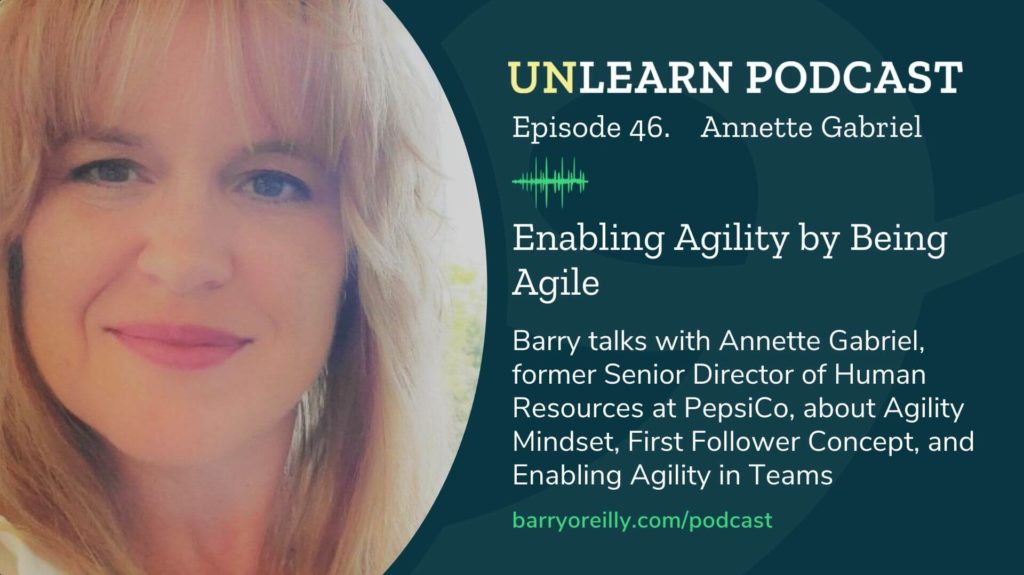This week’s guest, Annette Gabriel, is enthusiastic about helping leaders and teams adopt higher performance practices. Annette is a former Senior Director of Human Resources at Pepsico. Barry O’Reilly describes her as “one of the people who just shines when you hear her stories.” Annette and Barry discuss the framework of agility, and how to let teams lead. Listen to Enabling Agility by Being Agile with Annette Gabriel.
Agility Mindset
Leaders who adopt an agility mindset are eager to explore the world around them. Annette says that she views each job as a learning opportunity and a new experience whether she ends up liking it or not. Barry comments that trying and even failing is part of the process: you just have to recalibrate when things don’t go as you planned. If more people adopted an agility mindset, they would be open to trying new ways of working. [Listen from 4:45]

Unlearning Moments
Barry asks Annette to relate some of the mistakes she made along the way, and what she had to unlearn. “Trying to do too much at once whilst still trying to influence the leadership layer of the company,” she begins. She gives an anecdote of going at the leadership layer with working programs that didn’t resonate because they were too complicated for that audience. She was still learning the programs while trying to share and develop them, so she should have taken more time to fully understand them, and distill further before presenting to company leaders. Barry comments that leaders often find it hard to just get out of the way and let front line staff have more authority. However, when they start to see the values and principles come to life and the positive outcomes of them, it becomes easier for them to trust the process. [Listen from 8:25]
Being Agile
“There is no one way to be agile,” Annette remarks. “Being agile is actually pivoting and adjusting for what you need at that moment, at that time based upon what you’ve learned, what information you’ve gathered and what you’ve learned from testing,” she continues. It’s a common misconception that processes have to be standardized to be successful, Barry comments. A better approach is a localized one: focus on equipping teams to adapt based on the context. [Listen from 12:50]
First Follower Concept
“A champion can bring [the team] along a lot more quickly if you give that champion the license to take the team through [training],” Annette says. She advocates the importance of ‘first followers’. “A first follower,” Annette explains, “is that champion who is going to make the extra time investment and go deeper on things, when they try to pull a group into an exercise or facilitate a discussion.” She reiterates that these individuals are influential in reaching more people and bringing them onto the new plans and directions the organization may take. [Listen from 17:50]
The Team Leads The Way
Barry expresses that at times senior level management believe that they have all the answers and that this can create challenges within the organization. He adds that processes designed to make things work often keeps progress back because those processes rely on one or two people signing off a document. It is better to empower the hundreds of frontline workers – who deal with the issues and know what exactly the problems are – to come up with the solutions. Annette agrees and adds that a well-constructed team with all the right capabilities will be experts at resolving issues. [Listen from 27:05]
Looking Ahead
Not knowing what’s ahead is what excites Annette the most. She’s looking forward to her ‘next great learning experience.’ Her advice to leaders who may be struggling with unlearning: play along and see what happens, you may not always like the result but it will always be a learning experience. [Listen from 29:45]
Don’t want to miss a post? Sign up for my podcast newsletter and monthly newsletter!















